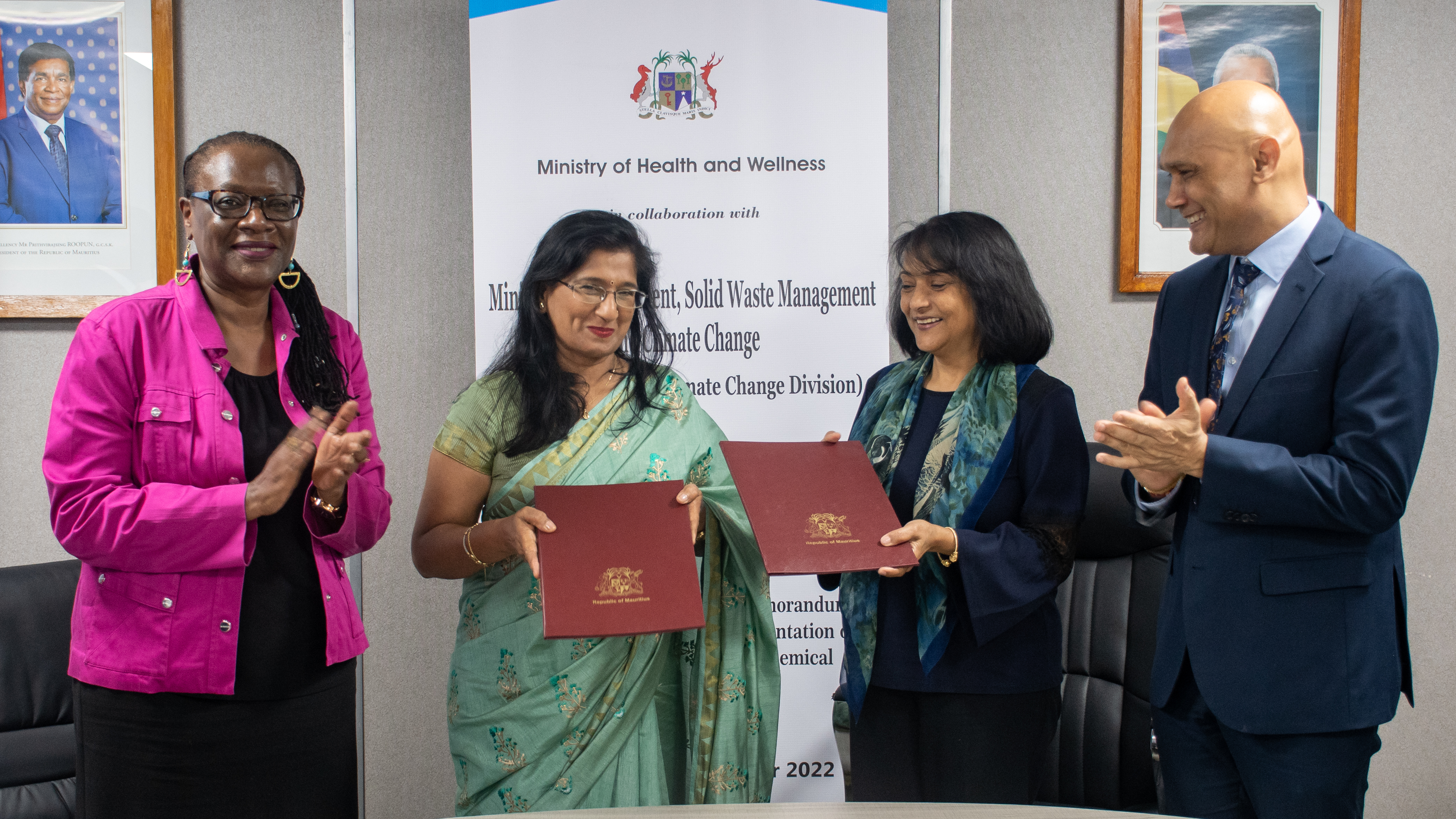The UNDP supports the Government of Mauritius to effectively manage healthcare waste through the ISLANDS project.
October 28, 2022

The ISLANDS project aims at preventing the future build-up of materials and chemicals that contain Persistent Organic Pollutants (POPs), mercury and other harmful chemicals.
On 26 October 2022, a Memorandum of Understanding (MoU) was signed between the Ministry of Health and Wellness and the Ministry of Environment, Solid Waste Management and Climate Change. This forms part of the ‘Indian Ocean Regional Project - Mauritius - Implementing Sustainable Low and non-Chemical Development in SIDS’ (ISLANDS) Project, funded by the Global Environment Facility (GEF) and supported by the UNDP Mauritius Country Office. The project aims at protecting human health and the environment from the harmful effects of hazardous chemicals and wastes in Mauritius. The lead implementing partner is the Ministry of Environment, Solid Waste Management and Climate Change while the Ministry of Health and Wellness and the Ministry of Agro-Industry and Food Security are responsible parties given that these ministries have some project activities under their purview.
Mauritius currently has only one operational waste incinerator, which is used to treat only anatomical and pathological healthcare waste. Out of the 20 tonnes of medical waste generated per week in the country, only 120 kg of anatomical and pathological waste are being treated at the incinerator on a weekly basis, while the rest is sent to the Mare Chicose landfill. The ISLANDS project aims at preventing the future build-up of materials and chemicals that contain Persistent Organic Pollutants (POPs), mercury and other harmful chemicals. It also aims at providing solutions to safely manage and dispose of existing harmful chemicals, and to ensure the management of products continuing to enter the country. The project is part of a wider “Indian Ocean Regional Project” that will be implemented by the respective Governments of the Union of Comoros, Maldives, Mauritius, and Seychelles which in turn forms part of the global programme, which will be implemented across the Caribbean, Indian Ocean and Pacific Island SIDS through a combination of global, regional and nationally targeted interventions.
In Mauritius, the project will consist of a number of activities, including the update of the Mauritius Network Service system used by the Dangerous Chemicals Control Board (DCCB), which is a department under the Ministry of Health and Wellness. This will enable DCCB officers to easily track and monitor the different types of imported chemicals. A feasibility study for a centralized treatment facility for healthcare waste, and an Environmental and Social Impact Assessment will also be carried out. Enabling policies and regulations will be developed to ensure the long-term sustainability of the project and gender-responsive training will be provided to healthcare staff and key stakeholders on the new regulations. The project document was signed in September 2022 and implementation is for a duration of 5 years.
During the keynote address, the Honourable Dr. Kailesh Jaguptal, Minister of Health and Wellness, explained that it is crucial to have proper segregation to ensure that infectious waste is properly diverted to the centralized treatment facility. He also added that as such, 300 staff will be trained in proper and safe waste segregation.
In her speech, Ms. Amanda Serumaga, UNDP Resident Representative for Mauritius and Seychelles, explained that UNDP’s work on healthcare waste management worldwide contributes to its broader commitment to build resilient and sustainable systems for health and accelerate progress towards the Sustainable Development Goals (SDGs).
With the Project document and MoUs already signed, implementation of the project activities has started and the outcomes will ensure that Mauritius meets its obligation under the Minamata and Stockholm Conventions while at the same time protecting human health and the environment.

 Locations
Locations